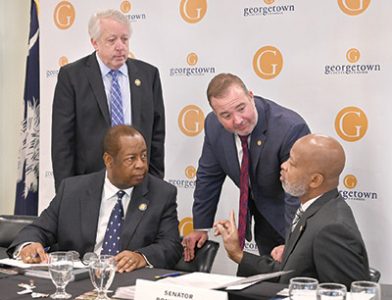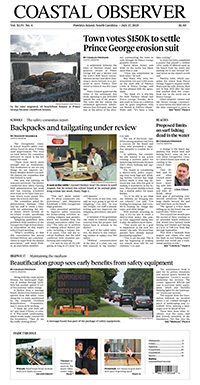Legislature
Weighted voting tips balance to GOP in ‘cosmic shift’

A dispute over appointments that had simmered for two years boiled over last week with Republicans on the Georgetown County legislative delegation ousting James Sanderson from the Board of Voter Registration and Elections.
Lawmakers said the move threatens to upend working relationships that transcend party politics and impact how the four-member delegation functions. It prompted the delegation chairman to consider briefly whether he should walk out.
“This represents what I consider to be a cosmic shift in how Georgetown operates, which is consistent with what I’m seeing around the state, and it’s troubling,” state Sen. Ronnie Sabb said.
Sanderson was nominated to the elections board in 2021 by state Rep. Carl Anderson, the current delegation chairman. He and Sabb are Democrats.
Sanderson is the president of the local United Steelworkers union. He has served on the elections board in the past.
State Sen. Steven Goldfinch and Rep. Lee Hewitt, Murrells Inlet Republicans, objected to the nomination, saying Sanderson’s ties to the Democratic Party made him too partisan to serve on the board that conducts elections. They abstained from voting in 2021 in order to uphold the tradition of not overruling their colleagues’ nominees. The appointment was made by the governor.
Even had they voted against Sanderson, Anderson noted at the time, his vote and Sabb’s would have prevailed because they represented 58.44 percent of the county’s population. Delegations use “weighted voting” to ensure equal representation.
With the 2020 Census, the balance shifted. Goldfinch and Hewitt now represent 53.96 percent of the county’s population.
The delegation met last week after a legislative workshop sponsored by the Georgetown County Chamber of Commerce. In front of an audience of about 300 at Pawleys Plantation, the lawmakers showed that they disagreed on issues, but managed to talk things through and work together.
As they took up an agenda of appointments to local boards in front of an audience of about 20, Anderson noted “we respect each others’ appointments.”
For vacant seats on the County Transportation Commission and the board of the Georgetown County Water and Sewer District, they did.
Anderson said he wanted to skip over the next agenda item: appointments to the board of Waccamaw Regional Council of Governments. “That would give us more time to deliberate,” he explained.
The delegation had passed up action on Waccamaw Regional in June because its records were unclear about which legislative districts were involved.
The two mayors
Hewitt wanted to replace Brendon Barber, the former Democratic mayor of Georgetown, with Carol Jayroe, the Republican who took office a year ago. He and Sabb shared the appointment.
“It’s our intent to appoint this mayor as well, but not at this particular time,” Sabb said.
The issue is complicated by the Waccamaw Regional bylaws, which call for 51 percent of the 25-member board to be elected officials from governments in the three-county region. Eight members represent Georgetown County. Also up for reappointment is Jerry Oakley, a former County Council member who is vice chairman of the Waccamaw Regional board.
“I don’t want Georgetown to be disadvantaged by not having our local official on,” Goldfinch said. “I would suggest we move forward.”
“Hold on now, Steve,” Sabb said. “If I choose not to move forward with an appointment I have, I think that is my prerogative.”
“I’m unsure why this wasn’t discussed before this meeting today,” Hewitt said. “This just kind of hit me out of left field.”
Anderson said the delegation would take it up in 30 days. He added that they needed to move the meeting along so the room could be prepared for another event.
Sabb said he wanted time to work out a way for Barber to stay on the board. He didn’t recall that the issue had been carried over in the past.
The vote to table the appointment was 2-2. Goldfinch called for a roll-call vote.
“This is not a thing about the mayor and the former mayor,” Anderson said.
Goldfinch said he understood, but asked for the roll call.
The vote was 2-2, but the Republicans prevailed to move the process forward.
In his 19 years on the delegation, “we never did a weighted vote,” Anderson said. “We are setting a precedent that is not good for Georgetown County period.”
“We’ve always worked out our differences in private,” Goldfinch said. “Our differences are irreconcilable in private at the moment, unfortunately. So it sounds like we’ve got to work them out in public. I hate that.”
There was nothing to work out in private, Sabb said.
He said the ability of delegation members to make appointments was at risk. “I hate it as well,” Sabb said.
Courtesy or request
Hewitt moved to appoint Jayroe.
“You’re changing fundamentally the system in Georgetown,” Sabb said. “Persons that come after us, they’re going to be arguing, fussing and fighting.”
“I’m going to ask one more time that we not do this today,” Anderson said.
Goldfinch gave the second to the motion and asked for a roll-call vote.
“I don’t want anyone to feel like we are against the mayor. That’s not it. It’s just where we are headed as a delegation, and it makes us look bad,” Anderson said.
Sabb said it was a question of courtesy, which he had never denied to another member.
“I don’t want to debate it anymore,” he said.
“I’m going to debate you on this, Senator,” Goldfinch said. “We all know why we’re here today; it’s because of the denial of a courtesy.”
“No,” said Sabb.
“Yes, sir, it is,” said Goldfinch.
“In my view, it was not a courtesy. It was a request. There’s a difference,” Sabb replied.
The request was the one made by Goldfinch in 2021 not to appoint Sanderson.
The vote to appoint Jayroe in place of Barber was 4-0. Oakley was also reappointed unanimously.
Anderson then skipped over the appointments to the Board of Voter Registration and Elections. After two appointments to a rural water district and an allocation of recreation funds, he repeated the need to let staff clean up the room and asked to continue the remaining business in another 30 days.
“I ask that we stick to the agenda,” Goldfinch said.
“I move that the meeting be adjourned,” Anderson said.
Goldfinch asked for a roll call.
“We’re not going to keep going through this,” Anderson said.
“Yes, sir, we will,” Goldfinch said.
“You’re putting this between the Republicans and the Democrats. You might as well come out and say it,” Anderson said. “And that is beyond us.”
Hewitt said he agreed, but noted that the agenda had been published and people had applied for the two vacant seats on the elections board, Sanderson’s and Billy Altman’s. To “just all of a sudden say, ‘we’re going to adjourn,’ I don’t believe is fair,” he said.
Anderson said there were items on the agenda that he didn’t approve.
“You don’t have to,” Goldfinch said.
Anderson asked “respectfully” for a delay.
“I respectfully deny it,” Goldfinch said.
Anderson leaned over to consult with Sabb. Goldfinch heard him mention walking out.
“Mr. chairman, if you walk out, you will be throwing up your hands on this entire thing,” Goldfinch said.
“I didn’t say that I was going to walk out, but from the way you have been acting today, none of us should be in here,” Anderson said.
He wondered what Goldfinch had against him and Sabb.
“Don’t get silly,” Goldfinch said, adding that Anderson knew the reason for the maneuvering. “The same reason you’re not wanting to take up this election.”
Elections board
Sabb claimed that the Republicans were trying to take his appointment. Hewitt said the appointment was shared between them.
“You knew this was going to happen last week,” Goldfinch told Sabb. “You had an option to keep an appointment, and you chose not to for the purposes of the public. And here we are.”
Hewitt nominated Leigh Ann Musiol of Pawleys Island to replace Sanderson.
In December, Karol Anderson, who chairs the county GOP, asked Gov. Henry McMaster to remove Sanderson from the board because he had endorsed a Democratic candidate in that party’s gubernatorial primary and because the United Steelworkers had contributed money to Democrats running for municipal office in Georgetown.
“We shouldn’t prejudge or be judgmental,” Sabb said.
Goldfinch read a statement Sanderson made to the Post and Courier praising Mia McLeod as “the person that working people should consider for governor.” He followed that by noting that his role on the elections board meant he couldn’t officially endorse candidates.
“I don’t need to wait for some investigation to conclude. I’m just going to take it from Mr. Sanderson’s mouth that he’s a partisan,” Goldfinch said.
Anderson said a decision on the appointment needs to wait for the findings of an investigation.
Hewitt said there was only a request for the governor to investigate.
“There’s a fundamental question associated with whether he’s crossed the line. I’m not convinced of it,” Sabb said. “What troubles me about this is I think you all are overreaching.”
Goldfinch said he didn’t want to use weighted voting, but added that “with deference to our colleagues comes personal responsibility to make good choices.”
“Good choices, like beauty, is in the eye of the beholder,” Sabb said.
“This one was a poor choice,” Goldfinch said. “It’s backfired on all of us. You cannot deny that.”
Sabb said he had someone else in mind for Sanderson’s seat.
Hewitt agreed to withdraw his nominee to allow Sabb to propose an alternative. The meeting recessed so the two could talk. When they returned, Sabb nominated Harold Jean Brown-Williams, a former school board member who later served on the S.C. Human Affairs Commission.
The vote was unanimous. Anderson said the delegation would meet again in 30 days to fill the other vacancy.
Making amends
“Steve and I just apologized to each other in the back,” Sabb announced. He added that he didn’t apologize for being an advocate for his appointees.
He later said he thought the delegation could still work together.
“They need to reverse that weighted-vote foolishness. I won’t rest with that being the order of the day,” Sabb added.
Sanderson, who will continue to serve until the governor approves Brown-Williams, said she was a good choice.
No one raised any concerns about partisanship after he was appointed, Sanderson said. He said that he invited McLeod to visit Liberty Steel because she favored dredging the port and opposed the city’s efforts to close the mill.
Of the delegation, he said “it’s become more partisan.”
But Sanderson wasn’t bothered by the decision.
Leaving the elections board, he said, is “an opportunity to be more vocally involved in what’s going on in Georgetown.”




